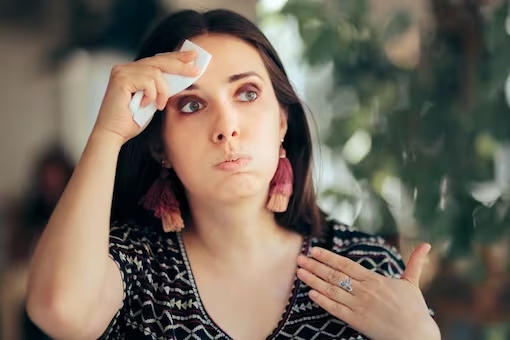Menopause is a state when menstruation ceases permanently for a minimum of one year, typically occurring between the ages of 45 and 55. Experiencing excessive hot flashes is a prevalent symptom during perimenopause, the transitional phase leading up to menopause.
Certain women encounter the warmth and reddening sensation of hot flashes without perspiring, whereas others sweat profusely to the extent that they require a change of attire. Most of the women going through perimenopause experience hot flashes, mood changes, weight gain, night sweats, weakness, etc., and a few suffer with day sweats as well, which is been less addressed.
When hot flashes occur during the night-time, resulting in both you and your bed linens becoming soaked, they are referred to as night sweats. These episodes of sweating might coincide with sensations of sudden warmth and increased heartbeats. This condition can have a significant impact on your well-being and lead to feelings of unease, potentially affecting your daily life, particularly in a professional context.
The human body is naturally inclined to maintain a stable core temperature. Consequently, when the ambient air temperature increases, it triggers the dilation of blood vessels (a process called vasodilation) in your skin. This response results in a reddening of the skin and initiates the perspiration mechanism.
Understanding the root cause of daytime sweating allows us to address the factors that initiate these episodes. Daytime sweating occurrences may require some time to alleviate, typically spanning a duration of around 1 to 4 years. Therefore, it is advisable to acquire strategies for coping with and effectively managing this condition.
- Women with excessive weight are more prone to get more sweat.
- Regular exercise reduces the hot flushes and sweat frequency.
- Stop smoking. Numerous research investigations have established a connection between smoking and the occurrence of hot flashes.
- Include soy in your diet, studies showing that soy reduces hot flashes have been inconsistent.
- Opt for lightweight attire and layer your clothing to allow for easy removal of heavier garments during a hot flash episode.
- Taking small sips from a tall glass of cold water can assist in maintaining a lower body temperature. Typically, we advise women to stay well-hydrated and avoid dehydration.
- Hot flashes can be triggered by the consumption of alcohol, caffeine, and spicy foods.
- The stress hormone cortisol may make women more sensitive to hot flashes, hence taking some deep belly breaths when you feel stressed or trying yoga and meditation can help relax the body.


